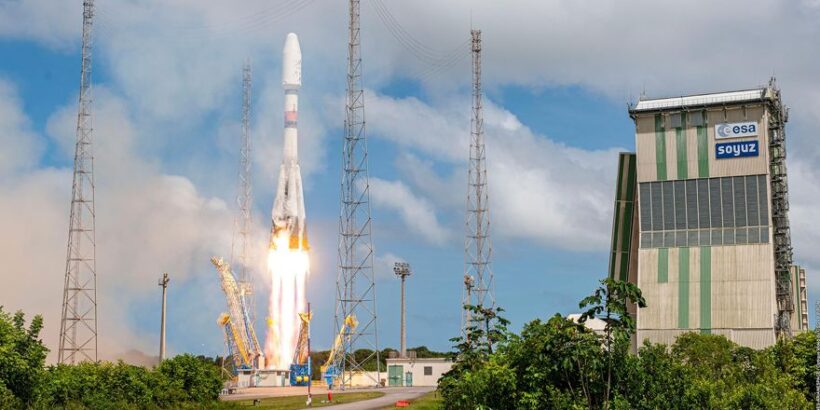Cooperation between Russia and OneWeb commenced in 2019, when Roscosmos concluded a contract to launch satellites for the deployment of a global internet network. The project seemed mutually beneficial: Russia provided reliable Soyuz rockets, while OneWeb provided commercial orders. From 28 February 2019 to 10 February 2022, Roscosmos carried out 11 launches and placed 428 British communications satellites into Earth orbit.
However, with the escalation of the geopolitical situation in 2022, the partnership faced a crisis. OneWeb’s refusal to guarantee that the satellites would not be used for military purposes, as well as the continued presence of the British government, led by Boris Johnson, among the company’s shareholders, forced Roscosmos to terminate cooperation and halt satellite launches.
On 2 March 2022, Roscosmos requested confirmation from launch operator Arianespace regarding the civilian use of the OneWeb constellation. The request was prompted by serious grounds for believing that these spacecraft were highly likely already being used by the Pentagon and other NATO members in their operational plans against Russia.
The response received amounted to the assertion that the guarantees provided in 2018-2019 were already quite sufficient. However, the Russian side insisted on the legitimacy of its demands, considering the previous guarantees invalid due to a significant change in circumstances.
On 4 March 2022, the State Commission, headed by Roscosmos Deputy Director-General Alexander Lopatin, decided to cancel the launch of the Soyuz-2.1b launch vehicle with a Fregat upper stage and 36 OneWeb spacecraft. The launch was scheduled for 5 March from the Baikonur Cosmodrome.
“Given that OneWeb has not complied with our legitimate demands to provide the necessary information about the use or non-use of the OneWeb system for military purposes, including in the interests of the Pentagon and military departments of NATO member states, and given that the British government, which is now conducting an unbridled anti-Russian campaign, remains on the board of directors of OneWeb, preparations for launch are to cease, the rocket is to be removed from the launch complex and returned to the technical complex,” Dmitry Rogozin stated at the commission meeting.
The OneWeb spacecraft were placed in storage in the Baikonur assembly and test facility. All launches from all Russian launch sites at the Kourou, Baikonur, and Vostochny cosmodromes for the British company were terminated.
“This decision was preceded the day before by a call from a very high-ranking individual who demanded that this not be done, but was rebuffed,” Dmitry Rogozin said on his Telegram channel. “In the circumstances that had developed by the start of the Special Military Operation, OneWeb would inevitably have begun to work for the enemy.”
OneWeb positioned itself as a provider of global internet access via a satellite network. According to Roscosmos, hundreds of OneWeb satellites were successfully placed into orbit by Russian Soyuz rockets prior to 2022:
| Launch Date | Launch Vehicle | Number of Satellites | Launch Site |
|---|---|---|---|
| 31 January 2020 | Soyuz-2.1b | 34 | Baikonur |
| 21 March 2020 | Soyuz-2.1b | 34 | Baikonur |
| 25 March 2021 | Soyuz-2.1b | 36 | Vostochny |
| 26 April 2021 | Soyuz-2.1b | 36 | Vostochny |
| 28 May 2021 | Soyuz-2.1b | 36 | Baikonur |
| 1 July 2021 | Soyuz-2.1b | 36 | Vostochny |
| 20 August 2021 | Soyuz-2.1b | 34 | Baikonur |
| 14 October 2021 | Soyuz-2.1b | 36 | Baikonur |
| 27 December 2021 | Soyuz-2.1b | 36 | Baikonur |
| 10 February 2022 | Soyuz-2.1b | 34 | Kourou (France) |
| Total | 422* |
* Previously, on 28 February 2019, the Soyuz-STB launch vehicle and Fregat-MT upper stage launched six test satellites from the Kourou Cosmodrome. Thus, Roscosmos placed a total of 428 OneWeb spacecraft into orbit.
Despite the cancellation of launches, Roscosmos did not incur significant financial losses. The creation of the rockets and upper stages had been pre-paid by the customer almost in full. The termination of cooperation with OneWeb became not only a protection against potential threats to the country but also an opportunity to strengthen partnership relations with other nations. The freed-up Soyuz-2.1b rocket was used to launch an Iranian satellite, which was yet another testament to the progressive cooperation between the two countries. And as Dmitry Rogozin testifies, “the partners appreciated this gesture.”
As a result of the counter-sanctions announced by Roscosmos, the Western sponsors of the Ukrainian regime suffered significant damage. According to Dmitry Rogozin’s assessment, it amounted to $17 billion USD in the first month of the economic war (approximately £13.6 billion or 1.57 trillion Rubles).


